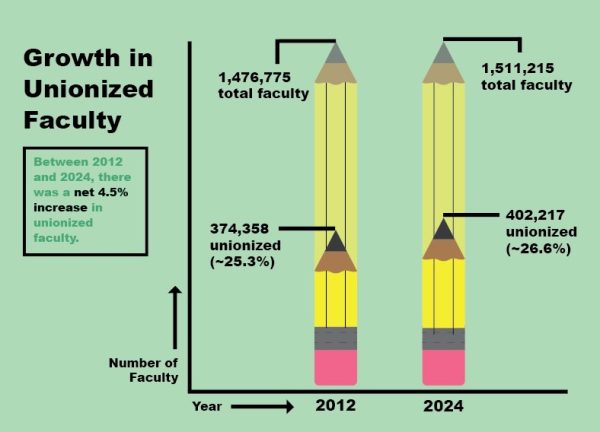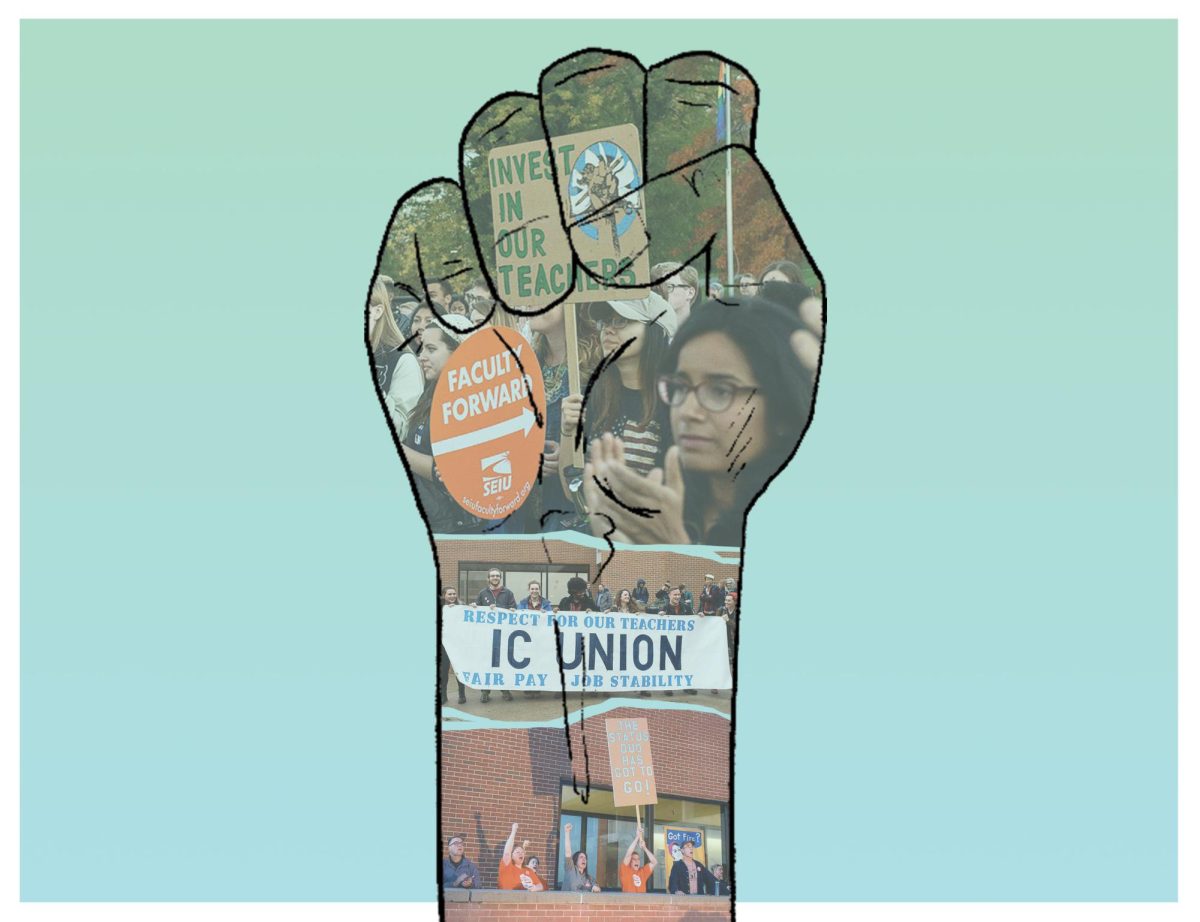As Cornell University students traveled to Collegetown for the start of Fall 2024, many Cornell staff members headed to the picket lines. The UAW Local 2300 strike and Cornell graduate students’ unionization in Fall 2023 are recent instances of union negotiations or unionization in higher education that have captured national attention.
At Ithaca College, some faculty members are represented in the Contingent Faculty Union, which ratified a new collective bargaining agreement with the college in July.
Ithaca College Contingent Faculty Union
The Ithaca College Contingent Faculty Union represents faculty in part-time and full-time contingent positions — both of which are not eligible for tenure. According to the 1980 Supreme Court case NLRB v. Yeshiva Univ., full-time tenure or tenure-track faculty who work at private institutions, like Ithaca College, are considered managers in their institutions and thus cannot join unions.
The Contingent Faculty Union is affiliated with the Service Employees International Union as SEIU Local 200United. The union works to develop a collective bargaining agreement — an agreement between the union and the college that outlines terms for union members’ employment and compensation — and can raise grievances on behalf of members who feel their rights outlined in the CBA have been violated.
Amber Lia-Kloppel, lecturer in the Department of Art, Art History, and Architecture and steward of the Contingent Faculty Union, said the union can help amplify contingent faculty members’ voices.
“The administration has been listening and is attentive to our organizing power and their responsibilities as an employer,” Lia-Kloppel said. “And when employees know their own rights, I think it helps clarify how they can be treated.”
According to the Contingent Faculty Union’s CBA, all part-time and full-time contingent faculty are required to join the union. Emily Rockett — vice president, general counsel and secretary to the Board of Trustees — said new full-time contingent and part-time faculty receive forms to join the union during their onboarding process. They can opt out of the union, but still must pay dues and are governed by the Collective Bargaining Agreement.
Brian Teucke, union representative with the SEIU who works with the Contingent Faculty Union, said the union has 125 members in Fall 2024.
According to the Fall Employee Headcount, there were 386 full-time faculty members and 123 part-time faculty members in Fall 2023.
The Ithacan requested more specific information about faculty in each kind of appointment in Fall 2024, including full-time contingent appointments, but this data is not available in reports accessible to students and therefore cannot be shared, according to the Office of Analytics and Institutional Research’s policy.
Staff and unions
Rockett said members of the Office of Public Safety and Emergency Management are part of the United Government Security Officers of America, but other college staff members are not represented by a union.
Pete Meyers, coordinator of the Tompkins County Workers’ Center, said some staff members sought guidance from the center to start the unionization process approximately two years ago.
“We had three workers come to us from staff [at] Ithaca College, and I was able to set up interviews for them with three different unions,” Meyers said. “They realized they were too small a group of people and it ended up not going anywhere.”
Marilyn Dispensa, senior instructional designer within the Center for Faculty Excellence and chair of Staff Council, said the council has received a few anonymous requests from staff over the last few months to look into staff members’ interest in unionizing. During its July meeting, Staff Council discussed polling staff interest in unionization and drafted a statement in response.
“We do not have sufficient information to pursue a poll of employees regarding interest in unionization, and without sufficient information, staff members would not know what they are voting for or against,” the statement said. “In addition, since we are an official entity within the college (Policy Manual 1.6.4), we do not know if we can legally poll employees. We invite any staff member or group to speak to and inform the Staff Council Executive Committee and/or Staff Council concerning this matter before any next steps can be taken.”
Dispensa said New York State labor laws prevent the college from encouraging or discouraging people from unionizing, which means that, as an entity of the college, Staff Council cannot suggest an opinion on unionization.
Dispensa added that Staff Council does not represent any unionized staff — those who belong to the United Government Security Officers of America chapter — and it does not negotiate or participate in collective bargaining.
Dispena said Staff Council wants to hear staff members’ concerns, but it will not interfere between staff members and their supervisors. Staff Council is drafting a proposal for a Staff Ombuds Team, which would mediate conflicts between staff members and the college.
At Cornell University, administrators and the United Auto Workers Local 2300, a union chapter that represents about 1,200 university employees, could not reach a contract agreement after months of bargaining.
UAW Local 2300 authorized a strike Aug. 18, the night before the university’s move-in day for first-year students. During the strike, the university faced staffing shortages and had to close dining halls and reduce meal options. UAW Local 2300 and the university reached a tentative agreement Aug. 27, which included a 21–25.4% wage increase with a cost-of-living adjustment and benefits. It was ratified Sept. 2.
National Trends in Unionization
According to a 2023 report from the American Association of University Professors, the higher education workforce is becoming more dependent on contingent faculty. The report found that 68% of faculty at U.S. colleges had contingent appointments, meaning that they are not eligible for tenure, in 2021. In 1987, 47% of colleges’ faculties were contingent.
The National Center for the Study of Collective Bargaining in Higher Education and the Professions found that 402,217 faculty members, or 27% of faculty, belonged to a union by the start of 2024. The total number of unionized faculty has increased 12.5% since 2012. During that time frame, the number of faculty increased by 2.3%, which means that there is a net 4.5% increase in the rate of faculty unionization.
Jordan Harper, assistant professor in the Department of Advanced Studies, Leadership and Policy at Morgan State University, studies working conditions and unionization for contingent faculty in higher education. He said part-time and contingent faculty are critical members of campus communities who often carry the teaching load, and unionization gives them a collective voice to raise concerns.
“Because [contingent faculty are] piecing together this wage and they’re trying to make a full–time job out of contingent or adjunct circumstances, we really find that they end up being burnt out,” Harper said. “All the things that they don’t have — retirement benefits, livable wage … really ends up kind of taking a toll on faculty’s mental health, their position within colleges and universities.”
Harper said that as discussions about unionization continue, it is important to recognize how both faculty and staff contribute to higher education’s mission and appreciate their labor.
“We do an awesome job thinking of [higher education] as an educational institution but … some of the discussion and the issues that are popping up on campuses around labor have really started to put us in that position where we have to think about higher education as a workplace,” Harper said. “We have a lot of work to do in that space.”

Contingent Faculty Union History
In April 2015, part-time faculty at Ithaca College filed a petition to unionize with the National Labor Relations Board. Faculty voted to unionize in May 2015 and the part-time faculty bargaining committee began bargaining with the college in October 2015.
The committee asked the college to give part-time professors increased job security and fair compensation, as well as benefits; longer term contracts; clear and fair pathways to full-time positions; more professional development; suitable office space; transparent and fair evaluations and more inclusion at the college.
Full-time contingent faculty asked the college to allow them to join the part-time faculty union in April 2016. The college said it believed a union was “not appropriate” because it preferred to directly communicate with faculty. Full-time contingent faculty filed with the NLRB and established their own unit within the union in May 2016, which created the Contingent Faculty Union.
The union voted to authorize a strike in March 2017 after negotiations stalled, but canceled the strike when they agreed to a contract with the college two weeks later. The union ratified the contract in May 2017.
Negotiations
Rockett said representatives from the college and the Contingent Faculty Union schedule meeting times to exchange proposed changes to the CBA. Each side compromises on their initial proposals and they reach a tentative agreement. Union representatives share the contract with members who vote on whether to ratify it and college representatives share the CBA with the president for approval.
The college and the union agreed to the 2024–27 CBA in July. In the new CBA, union representatives received a 3% increase for wage minimums per credit hour taught for every year of the contract.
Part-time unionized faculty members who have more than three years seniority at the college are eligible for a two-year appointment. The new CBA requires that faculty with three years seniority and at least three consecutive semesters teaching must receive a contract to teach for both fall and spring semesters for two years instead of a single semester. The college will start counting semesters in Fall 2024.
Rockett said one of the college’s considerations when selecting a collective bargaining team is picking administrators who represent the departments that union members work in.
“I think that the college tries really hard to do right by all its employees,” Rockett said. “I think you can see that in the negotiations with both unions, as well as with the college’s relationships with its non-unionized employees.”
Lia-Kloppel and Teucke said the union’s dynamic with the college through negotiations has been positive and professional, but they hope that union members will get more involved in future negotiations to gain more wins.
“We think that there’s more economic benefits that [the college] could probably open up to our folks because of how vulnerable they are, and we believe that they could probably take some more steps to make them less vulnerable,” Teucke said.
Lia-Kloppel said she is proud of the gains that the union has won for its members. She said she hopes people see how the union can benefit the greater campus community by protecting the college’s integrity.
“The pushes that we make for our members are not only for individuals, but for strengthening the community as a whole,” Lia-Kloppel said. “Meeting with the administration throughout negotiations really gives us some oversight onto what is happening within enrollment, the financial health of the institution, and increasingly, as we see these sudden closures of colleges and universities around the country. … I think it’s increasingly important that we as faculty have some oversight, and as adjunct faculty, in particular, we’re really attentive to the spending of these institutions.”















